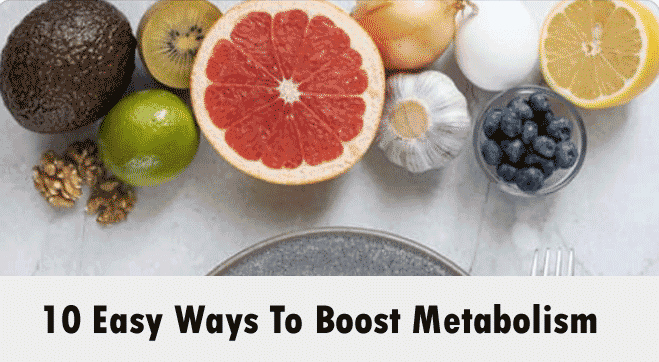Your metabolism plays an essential role in your overall health. Some ways to improve metabolism include adding more protein and spicy foods to your diet, consuming more caffeine, doing high-intensity exercises, and improving your sleeping patterns.
Apart from this, other ways, like avoiding highly processed food items and lifting weights, can also help. We have discussed these in more detail in the sections below.
Did you know:
- Type 2 diabetes, NAFLD (Non-Alcoholic Fatty Liver Disease), and hypertension are 3 such life-threatening metabolic diseases that affect the global population severely. 1
- According to the World Health Organisation, obesity, the condition of being unhealthily overweight (poor metabolism is the cause), kills almost 2.8 million people globally every year. 2
Improving metabolism is essential regardless of age and gender to avoid long-term health risks.
But before learning more about how to increase metabolism, you can take a metabolic screening test. This test can help you understand your requirements better. As a result, out of the many ways to boost your metabolism, you can choose the best one based on your needs.
What Is Metabolism in The Body?
The process by which your body converts the food that you eat into energy is called metabolism. Vital for your health, it can be classified into 2 types or stages3 called—
- Anabolism: Constructive metabolism
- Catabolism: Destructive metabolism
1. Anabolism
Anabolism is responsible for—
- Storing energy obtained from food
- Providing support to the formation of new cells
- Carrying out the maintenance of body tissues
2. Catabolism
Catabolism works oppositely to anabolism. Hence, it is responsible for the breakdown of energy to support functions such as—
- Body movement
- Creation of heat
- Providing fuel to your body 4
Importance of Improving Metabolism In Overall Health
Metabolism is a key process that controls how your body works. It affects everything from thinking to movement. Metabolism drives almost every action your body takes, both inside and outside.
Hence, it is important to improve metabolism to facilitate the following processes smoothly in your body—
- Digestion
- Breathing
- Pumping of blood
- Healthy growth
- Healing of wounds
- Balancing your hormone levels
- Maintaining your body temperature
But before understanding whether you need to decrease or increase your metabolism, you must know your current metabolic status. To do this, you can take a basic metabolic panel test.
How To Boost Metabolism – 10 Ways
Eating enough protein, drinking green tea and coffee, replacing processed foods with nutritious fruits and vegetables, doing high-intensity exercises and having a good sleeping routine are excellent ways to increase metabolism.
In the section below, we have described these in more detail.
1. Eat Enough Good Quality Protein
Your body uses your calorie intake to digest food and use the nutrients present in it. This process is called TEF, the thermic effect of food. That is why your metabolism increases in the short term when you eat.
Research has shown that high-protein foods have a higher TEF when compared to carbohydrates and fats. A high-protein diet ranks first among our top ten methods for boosting metabolism.
Apart from this, a high-protein diet also keeps you full for a long time. This prevents snacking between your meals as well as overeating. Avoiding both of these is important to increase metabolism.
Therefore, here is a list of some high-protein foods that work perfectly well to boost metabolism—
- Eggs
- Dairy
- Beans
- Legumes
- Nuts
- Lean meat
- Fish 5
2. Avoid Highly Processed Foods
Eating a protein-packed diet is important, but avoiding ultra-processed foods is even more important to increase metabolism healthily and naturally. Research has shown that more processed food is directly linked to weight gain and increased calorie intake.
Moreover, while processed foods might appear to be appetising and are generally more affordable than healthy foods, they are a threat to your overall health in the long run.
Hence, to boost metabolism, you must avoid food items that have the following elements in a high amount—
- Added sugars (especially refined sugar)
- Sodium (added salts)
- Saturated fats
- Trans fats
- Flavouring agents
- Emulsifiers
- Calories
Likewise, it is essential to replace ultra-processed food items with the following healthier alternatives to increase metabolism—
- Whole grains
- Fat-free dairy products
- Low-fat dairy products
- Lean meats
- Poultry
- Fish
- Beans
- Eggs
- Nuts 6
3. Have Enough Calories
Drastically reducing calorie intake is a common misconception about increasing metabolism through diet. It can be counterproductive. Regarding this, the number one mistake that most people make is skipping meals to decrease their calorie intake. It is not the correct way to boost metabolism.
In fact, it works contrarily. When you skip meals, your body lacks energy and starts breaking down muscle tissue to compensate. This process actually slows down your metabolism.
Hence, even though it is essential to avoid the overconsumption of calories on your way to improve your metabolism, having sufficient calories is equally important. 7
4. Use Caffeine to Increase Metabolic Rate
Caffeine, especially the one that is present in coffee, is known to increase your metabolic rate. Hence, it helps to boost metabolism by encouraging the below-mentioned functions of your body—
- Regulation of lipid and fat metabolism
- Quick burning of fat
However, how coffee works in your body depends on factors like age and weight.
5. Drink Tea
Drinking tea works similarly to drinking coffee to improve metabolism. However, one added benefit of tea over coffee is that it has an additional compound called catechin. Like caffeine, catechin also increases metabolic rate and has several other health benefits.
Hence, two types of teas that can help you to boost metabolism efficiently include—
- Oolong
- Matcha green tea
When combined with an exercise plan, these can—
- Burn extra calories quickly
- Initiate faster fat oxidation
- Increase your capacity to burn fats easily
But remember that, same as coffee, the functioning of tea in your body is dependent on individual factors like age and weight.
6. Eat Spicy Foods
While ‘hot and spicy foods’ are a treat to your taste buds, they also work excellently to increase metabolism.
Here is what happens to your body when you eat spicy foods:
- Your body temperature rises. This happens because of the burning of energy, which is a result of metabolism. Hence, spicy foods boost metabolism temporarily.
- Plus, they also make you feel full faster. So, when the food is spicy, you tend to eat less than usual because of the level of satisfaction it provides at a quick speed.
Hence, when you’re trying to increase body metabolism, you can add the following spicy ingredients to your food—
- Jalapeños
- Chili peppers
- Curry powder
- Cayenne peppers
- Other hot spices 8
7. Exercise More Often
Metabolism is not just a game of dietary changes. Likewise, to increase metabolism, exercising frequently is as crucial as eating healthy food.
So, here are some exercises that can help you to boost your metabolism:
7.1. Cardiovascular Exercises
Cardiovascular exercises that can help you to improve your metabolism include—-
- Running
- Swimming
- Aerobics
- Walking
While it might not always be possible, you should try your best to perform these exercises daily as they offer numerous benefits—
- A temporary suppression of your appetite after exercising
- And a faster burning of calories
7.2. Weight Training
Weight training offers benefits such as—
- Toning your muscles
- Boosting your lean tissue mass
- Burning more calories
All of these factors ultimately boost metabolism and keep you fit and healthy in the long run.
8. HIIT
HIIT expands to High-Intensity Interval Training.
As already mentioned above, along with eating healthy, you also have to burn out enough calories to boost metabolism, especially when your end goal is to lose weight. In this situation, HIIT is your best bet.
While staying fit and doing moderate physical activities is good for your overall health, HIIT has the potential to provide added benefits in comparatively less time than these.
These benefits include reducing—
- Body fat
- Heart rate
- Blood pressure
Apart from these, high-intensity interval training also improves insulin sensitivity and balances your blood sugar levels. It is a great advantage for people who are at risk of diabetes as it is highly beneficial for your long-term health. 9
What’s more, is that HIIT is one of the best ways to increase metabolic rate. This means that after you have performed the high-intensity exercises, your body will be able to burn more calories for an extended duration. Hence, even after you stop exercising, your body can still burn calories faster than usual for hours after HIIT.
Research studies have also concluded that high-intensity interval training can shift your body’s metabolism from using carbohydrates for energy to using fat for the same.
The best part is that, unlike other exercises, you don’t have to spend hours doing high-intensity training exercises. It is a short-duration activity that consumes a minimum of your time and produces maximum benefits.
But before you start doing any HIIT exercises, it is a good idea to take a complete body checkup package. This can help identify your unique needs so that your medical expert can suggest which type of exercise would work best to increase your metabolism.
9. Do Not Sit Continuously
Sitting continuously for a long span does more harm to your body than good. This is especially true for people who have desk jobs. It is important to make sure that you take walking breaks after set intervals to avoid the buildup of body fat.
Moreover, when you’re trying to increase body metabolism, sitting continuously can backfire your attempts by slowing it down. Even when you are not trying to improve metabolism, excess sitting is still harmful because it—
- Negatively affects your body’s capacity to regulate the blood pressure as well as the blood sugar levels
- Makes your muscles and bones weaker 10
10. Sleep More
Research has shown that sleep deprivation is one of the most prominent causes of weight gain and slow metabolism.
The mechanism that works behind it is simple: When you sleep less, the hormones that control hunger and appetite undergo an imbalance. Due to this imbalance, you have more cravings for food, and ultimately, you end up eating more than usual.
That is why having enough sleep every night is necessary to increase metabolism.
Ideally, to boost your metabolism, you must aim to get at least 7 to 8 hours of continuous and undisturbed sleep daily.
Why To Increase Metabolism? Fast Metabolism Benefits
Adopting ways to increase metabolism encourages weight loss. Likewise, once you have a fast metabolism, you will be able to burn calories faster. As a result, there will be less fat accumulation in your body, which is good for your overall health. 11
However, having a fast metabolism is not only good for weight loss but also has a wide variety of other benefits.
For Example—
A fast metabolism might keep you away from obesity. Obesity means being unhealthily overweight. It is a risk factor for a large number of short-term as well as long-term diseases. Examples of such diseases include type 2 diabetes, heart disorders, and even specific types of cancers. 12
There are many ways to increase metabolism. What works best for you depends on factors like your age, weight, lifestyle habits, and the presence or absence of any other medical disorders.
Hence, to start with, you can book a blood test at home. Following this, you can take a comprehensive metabolic panel test to get insights into your overall metabolic health. These measures can help you understand more about your current situation so that you can take the right steps in a timely manner.
Sources
Ref Links:
- The global burden of metabolic disease
- Obesity
- Metabolism
- Understanding Your Metabolism
- The 11 Best Foods to Boost Your Metabolism
- Eating highly processed foods linked to weight gain
- Metabolism
- 7 Ways to Speed Up Your Metabolism
- 7 Benefits of High Intensity Interval Training (HIIT)
- Why we should sit less
- Fast Metabolism 101: What It Is and How to Get It
- Obesity and overweight








